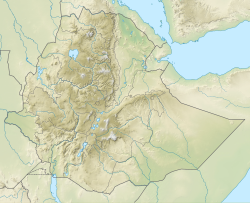Dillo | |
|---|---|
 Interactive map of Dillo | |
| Coordinates: 4°15′N37°42′E / 4.25°N 37.7°E | |
| Country | |
| Region | |
| Zone | Borena Zone |
Dillo is a district of Borena Zone in the Oromia Region of Ethiopia. [1]
As of 2013 [update] , the population was estimated at 43,853 (21,543 female and 22,310 male) with 97% rural and 3% urban. The dominant climate condition is arid and the population relies on hand-dug shallow wells and ponds for water sources. The residents engage in livestock production, predominantly cattle, sheep and goats, but also equines, camel and poultry. [1]
